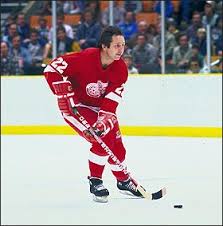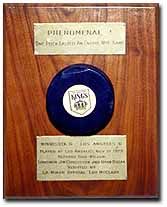(the following column can also be viewed at RetailDetroit.com, where a new column from yours truly appears each Sunday or Monday. They will also appear here for your reading pleasure. For archives of my columns there, go to www.RetailDetroit.com and click on "Columnists")I’ve known Harvey Theeck for 20 years, so I figured it was about time that I found out more about him.
Like, for instance, he once considered himself "Downriver’s Dick Vitale." That’s okay; I always preferred ole Harv to the real Dickie V, anyway.
Harvey Theeck is the equipment manager for University of Detroit Mercy varsity athletics, has been for 14 years now, and only the other day did I finally find out what he did for a living.
"Order, inventory, issue, collect, maintain," Harvey told me, describing his job in five words into a telephone from his office, which I have seen, by the way. It’s not much. Clark Kent had bigger quarters in which to change.
Those five words refer mainly to uniforms. Lots of uniforms. UDM has 16 varsity sports, and over 300 athletes playing them, and they all need to look clean and spiffy before they break sweat. Harvey makes sure their duds are shipshape. Then he gets to clean them, when they don’t smell so nice. Fourteen years of this must qualify him as an honorary homemaker.
It’s not just uniforms, though. There’s equipment -- he IS the equipment manager, after all. This means that if a basketball hoop structure goes boom, or a low-jump hurdle wobbles too much, Harvey is on the scene. Don’t snicker. YOU try playing basketball with a three-foot high hoop.
"In my first season as equipment manager, a strut on one of the basketball hoop structures went bad," Harvey told me. "I had to make sure it got fixed. There was a 20 minute delay before the start of the game." The UDM men were to play Loyola that night, and the broken basket was at the end of the court where the Titans were warming up. There had already been such a long delay to fix everything, so the game was begun without UDM’s guys getting a chance to truly warm up. No matter. They saved their warming for the game. They beat Loyola by 25 points.
I met Harvey Theeck back in the day -- the mid-80’s, to be exact -- when I was in local cable television production downriver. Harvey, teaching at Allen Park Cabrini High School by day, was our color analyst for prep basketball by night. It was a gig he cherished, so much so that he fancied himself a nickname and a persona.
"It was at a time when Dick Vitale was gaining prominence as an analyst," Harvey said. "And I always liked U of D’s program (Vitale had been U-D’s coach from 1973-77), so I kind of considered myself ‘Downriver’s Dick Vitale.’"
I directed many of those broadcasts from the production truck, and I can tell you that Harvey Theeck was one of the best basketball analysts I’ve heard, so you know. He teamed with the Bobs -- first Lewandoski and then Zahari, and we had a ball bringing weekly games to TV sets downriver.
"I remember Allen Park High had a team that was 2-20 with all freshmen starters, and by the time they were seniors they went something like 24-2," Harvey said. "Back in those days, you had great teams at Southgate Aquinas, Flat Rock. I had a lot of fun doing those games, especially during March Madness."
*****************************
"I have always liked the program at U-D.....And here I am, working for the school."*****************************
I asked Harvey what was the best part of an equipment manager’s job, once I was enlightened what the equipment manager’s job was to begin with.
"Game day," he said without hesitation. "That quiet moment when everything is laid out and clean, just before the team comes in and dresses. That’s cool." Harvey says his job is mainly "preventive maintenance" on game day, so when the teams are in action, he is there, ready if needed. Only he rarely is needed, so "they pay me to watch games," Harvey said with a chuckle.
Unfortunately, of those 16 varsity sports at UDM, none are baseball. The university dropped the program a few years ago amidst a terribly rampant budget cut in the athletic department. Oldtimers will tell you that in its heyday, U-D’s baseball program was in the upper echelon nationally. For years the team was coached by Bob Miller, a favorite of Harvey’s.
"Bob Miller was a character, always telling stories," Harvey said, and it was easy to notice the wistfulness in his voice. "He would do magic tricks in the dugout. He was just a great guy." Miller, who pitched for the Philadelphia Phillies "Whiz Kids" in 1950, is also the answer to a trivia question: Name the first time two rookie pitchers both started the same World Series game. It was 1950, when Miller faced the Yankees’ Whitey Ford in Game 4. That was the only time, too, until it occurred again in 1997.
"It’s sad we don’t have baseball anymore (at UDM)," Harvey said.
Another character was the late Ricky Byrdsong, who coached the mens basketball team in the early 1990’s. "Byrd would tell his players he wasn’t going to be at practice," Harvey recalled. "But then he would hide up in the press box and catch them goofing off." And there was more Byrdsong. "Sometimes he ran a drill where if you missed a free throw, you had to remove a piece of equipment." How bad were some of the free throw shooters? "Some guys were down to sneakers and a jock strap," Harvey said.
Harvey Theeck entered the world of uniforms, baskets, hurdles and batting cages back in 1989, when he saw an ad in a newsletter for a Director of Intramurals at U-D. At the time, he was working at Selfridge Air Base, in the recreation department. He applied, got the job, and moved into the equipment manager position in 1991. And he has seen a change in athletes over the past 14 years.
"Kids today would rather try to walk on to a program like Michigan, Michigan State, instead of getting a free ride at a school like UDM," Harvey said by way of observance. That change hasn’t helped recruiting, for the schools like UDM, EMU, etc. would hang their hats on snagging players who weren’t quite Big Ten ready. Now, those players appear willing to take their chances at the bigger schools. "It’s especially true in basketball," Harvey told me. I guess they want to play in games in which Dickie Vitale might be announcing.
I still see Harv occasionally, whenever I find myself at Calihan Hall, working for the Catholic Television Network. He is hyped about MCS Magazine. "I hope it makes it," he told me. "We’ve had magazines like that come and go." I was the choir, and he was the preacher. But Harv is a subscriber, so he’s obviously a practitioner of his preaching.
But back to UDM. "I have always liked the program at U-D," Harvey said. "And here I am, working for the school. People from out of town still say to me, ‘Oh yeah -- isn’t that the school where Dick Vitale coached?’"
Vitale hasn’t worked at McNichols and Livernois in almost 30 years. And Harvey hasn’t been "Downriver’s Vitale" for almost 20. But what are you going to do, when there are uniforms to clean, press and lay out for today’s Titans? Bet Dickie V. never did that.























